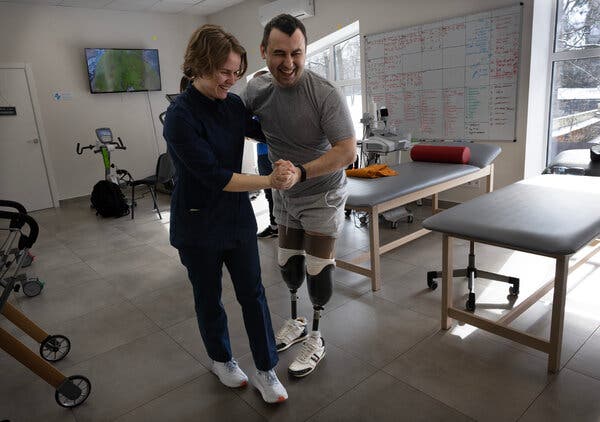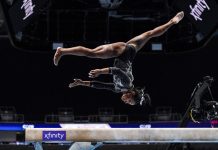Artem Moroz’s four-mile race in Central Park in Manhattan this month didn’t go as planned.
The former Ukrainian soldier had hoped to run on new prosthetics made for him in the United States, but they weren’t ready in time for the race. So he walked across the start using prosthetics he had brought from home and was pushed in a wheelchair the rest of the way.
As Moroz’s guide propelled him up the hill, he spread his arms out wide, like a child imitating an airplane’s flight. The corners of a Ukrainian flag tied to the back of the chair rippled in the breeze.
He wasn’t running yet, but knew that he would be soon.
Moroz, 44, had been running since he was a child. He and his family live in Irpin, just west of Kyiv, and “it was impossible not to run,” he said.
Before Russia invaded Ukraine last year, Moroz would start his day by running: at sunrise through a nearby forest before going to work at large construction sites, where he was a project manager.
Then war arrived.
Moroz joined the military in late March 2022, after watching Russian soldiers attack Irpin, and became a platoon commander. On Sept. 14, he and his unit were hit by a rocket in the Kherson region. If not for Polish doctors and paramedics, he would have died, he said, but both his legs were amputated below the knee. At first, he couldn’t imagine being able to stand again, he said.
While in a hospital in Mykolaiv, he watched a documentary on YouTube about the 2013 Boston Marathon bombings and the way the city and running community had come back stronger in 2014.
The movie gave him a goal: Run the Boston Marathon, which was then six months away.
Social media facilitated a key connection as he began his pursuit. Nadiia Osmankina, a Ukrainian who came to the United States a year ago for the Boston Marathon and stayed because of the war, saw his story and reached out to him. Running Boston changed her life, she said, and she wanted Moroz to get that same opportunity.
She had connections with both the Ukrainian Running Club in New York City and the president of a foundation, Revived Soldiers Ukraine, that helps wounded Ukrainian service members. The foundation’s president, Iryna Vashchuk, had been a professional runner and was born in Irpin.
The foundation has a center in Orlando, Fla., where soldiers are fitted for prosthetics. They were able to provide Moroz with both regular walking prosthetics, for daily life, and a specialized type used for running, which are carbon fiber curves that have rubber treads around the edges of the “feet.”
Moroz arrived late last month and figured that while he was in the United States, he could run some races. The Ukrainian Running Club has a big presence at many races staged by the New York Road Runners, the organizer of the New York City Marathon, and they connected the Road Runners and Moroz so he could pick a race.
But becoming accustomed to new prosthetics, especially running blades, isn’t like slipping on a new pair of sneakers.
“It’s a whole different muscle memory, especially for above-the-knee amputees,” said Mary Johnson, who had one leg amputated above the knee after a traumatic injury.
You have to trust that your foot will hit the ground underneath you where you expect, or you’ll land on the ground, she said.
The Central Park race in early April came just a week after Moroz had arrived in the United States. By then, reality had set in: He wouldn’t be competing on his new running blades. Still, he was back out there on a racecourse.
Organizers allowed Moroz and Osmankina to start 10 minutes early so he wouldn’t be jostled in the crowded corrals. Except for walking across the starting line, this first race would be in a wheelchair. Some runners from the Ukrainian club cheered at a spot on the course.
Just after he finished, Moroz was already looking ahead to his next race: Boston, in two weeks. Not the marathon, but the five-kilometer race the Boston Athletic Association puts on two days earlier. This year, it fell on the 10th anniversary of the 2013 bombings. Even with his slow early progress, Moroz thought he might be able to run on his new blades in Boston.
Two days before the race, Moroz was practicing on his new walking prosthetics in Orlando in a parking lot. The fit still wasn’t quite right, he said. Small changes, even drinking a glass of water, altered how they would fit. That’s not unusual for amputees. The doctors would tweak one thing and he would try it, and then they would adjust again.
Sean Karpf, who was wounded while serving in the U.S. Army and lost part of one leg below the knee, said that during the first two to three years after his injury, he had needed adjustments every four to six months because of the changes in his residual limb — not unusual for amputees.
In the United States, medical insurance doesn’t cover adaptive sports equipment, which is not deemed medically necessary and can be expensive. A running blade can cost $12,000 to $15,000. Above-the-knee amputees also need a knee joint, which costs more.
While the Department of Veterans Affairs generally will cover the cost of that type of equipment for American troops injured during their service, the wait can be as long as 18 months. Americans who aren’t in the military often rely on fund-raising efforts or grants through nonprofit groups. Johnson got her running prosthetic through the Challenged Athletes Foundation, which provides grants for adaptive equipment and camps and clinics for people to learn adaptive sports.
Moroz finally got his running blades a few days before his Boston race, but he wasn’t ready to run on them, so he instead used his walking prosthetics for the 5K event. After the race, he put on the running blades for photos at the finish line with Osmankina. He couldn’t stand, much less walk, without leaning on someone for balance. When Osmankina stepped away, Moroz nearly fell.
Still, seven months and a day after Moroz had been carried from the battlefield by Polish medics, his life in danger, he ran for the first time, in Boston. It wasn’t the marathon, as he had imagined, but that didn’t matter. He was running.
Soon, Ukraine will have more capacity to help people injured in the war instead of relying on European and American medical centers. Unbroken, an organization focused on helping Ukrainians heal from traumatic injuries sustained in the war, is retrofitting an old military hospital in Lviv from the Soviet Union era, said Dr. David Crandell, who is the medical director of the amputee center at a rehabilitation hospital in Boston and part of the World Health Organization’s technical working group on rehabilitation for Ukraine. Next month, Unbroken expects to open the former hospital as a center focused on amputee and post-traumatic stress care.
Demand is high. The First Union Hospital in Lviv is receiving 25 to 100 new trauma patients each day, Crandell said. He estimates that the country will have to accommodate 5,000 to 6,000 new amputees because of the war.
“You can imagine what Boston saw at the Boston Marathon, every single day for a year,” Crandell said.
This race, which Moroz had been inspired to run only months earlier from his hospital bed, began with Osmankina riding in the wheelchair, holding a flag, as Moroz pushed her. A little farther on, a slippery patch on the road made him slide, and before the second turn on the course, they had switched positions. Osmankina pushed Moroz, his feet lifted so the heels of his everyday prostheses wouldn’t catch on the ground. He lifted his arms up, encouraging the spectators who lined the course to cheer louder.
They arrived to fans. Andriy Boyko, a Ukrainian who lives in Melrose, Mass., a suburb north of Boston, showed up with his family to cheer from the sidelines. Moroz later said he had heard many people cheering for him and for Ukraine during the race, which he had not expected.
As they approached the end of the race, Moroz and Osmankina switched places again. Moroz ran, pushing his guide over the finish line.
The marathon would be there when he was ready. As he spoke, a good 20 minutes after he had crossed the finish line, his hand still trembled from the adrenaline.
“It might be I will not sleep tonight,” he said.
Hits: 0










